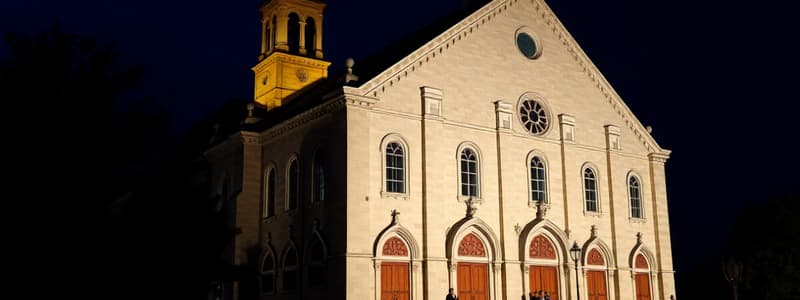Podcast
Questions and Answers
According to Aquinas, a tyranny is the best form of government because it concentrates power and ensures efficient decision-making.
According to Aquinas, a tyranny is the best form of government because it concentrates power and ensures efficient decision-making.
False (B)
The Edict of Milan primarily aimed to suppress the growing influence of Christianity within the Roman Empire.
The Edict of Milan primarily aimed to suppress the growing influence of Christianity within the Roman Empire.
False (B)
Biblical literalism involves interpreting biblical texts by considering their historical and cultural contexts, as well as the author's intent.
Biblical literalism involves interpreting biblical texts by considering their historical and cultural contexts, as well as the author's intent.
False (B)
Hobbes believed that the state of nature is characterized by unending peace and cooperation, necessitating only minimal government intervention.
Hobbes believed that the state of nature is characterized by unending peace and cooperation, necessitating only minimal government intervention.
The Donation of Constantine was a document used to consolidate Papal power, by asserting that Constantine granted the Pope authority over both spiritual and secular affairs.
The Donation of Constantine was a document used to consolidate Papal power, by asserting that Constantine granted the Pope authority over both spiritual and secular affairs.
Flashcards
Apologetics
Apologetics
Defense of the Christian faith through reasoned arguments.
Civitas Dei
Civitas Dei
City of God; Augustine's concept of a spiritual city of believers.
Prima sedes a nemine judicatur
Prima sedes a nemine judicatur
The doctrine stating ‘the first see is judged by no one’ referring to the Pope's authority.
Biblical Hermeneutics
Biblical Hermeneutics
Signup and view all the flashcards
Sophists
Sophists
Signup and view all the flashcards
Study Notes
- Apologetics is the reasoned defense of religious beliefs.
- Aquinas was a highly influential philosopher and theologian; his work Summa Theologiae is a key text.
- Augustine was an early Christian theologian and philosopher whose writings influenced the development of Western Christianity.
- Biblical Hermeneutics is the study of the principles of interpretation of the Bible.
- Biblical Literalism is the interpretation of the Bible based on the literal meaning of the words, without regard to other contexts.
- Civitas Dei (The City of God) is a book by Augustine contrasting the City of God with the City of Man.
- Charlemagne was the King of the Franks and Holy Roman Emperor, instrumental in uniting much of Europe.
- Christendom is the worldwide body or community of Christians.
- Christos is the Greek term for "anointed," used as a title for Jesus.
- Constantine was the Roman Emperor who legalized Christianity, playing a key role in its spread.
- Donation of Constantine is a forged Roman imperial decree which purported to transfer authority over Rome and the western part of the Roman Empire to the Pope.
- Duo sunt is a Latin phrase meaning "there are two," referring to the dual authority of the church and state.
- Edict of Milan was a proclamation that permanently established religious toleration for Christianity within the Roman Empire.
- Edict of Thessalonica was issued by Theodosius I, making Christianity the state religion of the Roman Empire.
- English Civil War was a series of armed conflicts and political machinations between Parliamentarians and Royalists.
- English Reformation was a series of events in 16th-century England by which the Church of England broke away from the authority of the Pope and the Roman Catholic Church.
- Gregory the Great was Pope from 590 to 604, considered a Doctor of the Church, and known for his administrative abilities.
- Harry Frankfurt is a contemporary philosopher known for his work on bullsh*t and moral responsibility.
- Henry VIII was the King of England who broke with the Roman Catholic Church and established the Church of England.
- Hobbes was an English philosopher known for his work on political philosophy, especially his book Leviathan.
- Historical Criticism is a branch of criticism that investigates the origins of ancient texts in order to understand "the world behind the text".
- Investiture Controversy was a conflict between the church and state in medieval Europe over the ability to appoint local church officials
- Justin Martyr was an early Christian apologist and philosopher.
- Leo the Great was Pope from 440 to 461, known for his contributions to Christology.
- Letter to Diognetus is an early Christian apologetic text.
- Leviathan is a book by Thomas Hobbes concerning the structure of society and legitimate government.
- Libido Dominandi is a Latin phrase meaning "lust for power," often used in political and theological contexts.
- Magisterial Reformation refers to the Protestant Reformation that received support from the state.
- Pentateuch is the first five books of the Hebrew Bible: Genesis, Exodus, Leviticus, Numbers, and Deuteronomy.
- Pliny was a Roman author, naturalist, and natural philosopher, and naval and army commander of the early Roman Empire.
- Prima sedes a nemine judicatur is a Latin phrase meaning "the first see is judged by no one," referring to the Bishop of Rome (the Pope).
- Sophists were ancient Greek teachers who specialized in using philosophy and rhetoric.
- Summa Theologiae is the best-known work of Thomas Aquinas.
- Summum bonum is a Latin phrase meaning "the highest good," often used in philosophy to describe the ultimate objective.
- Tertullian was an early Christian author from Carthage known for his apologetic works.
- Thomas Müntzer was an early Reformation-era German theologian who was a leader of the German Peasants’ War.
- Torah is the first five books of the Hebrew Bible, also known as the Pentateuch.
- Trajan was a Roman emperor known for his military campaigns and public building programs.
Short Answer Topics
- Biblical passages outline a "political" vision by establishing principles of justice, leadership, and social order within a covenant community.
- Constantine contributed to the rise of Christendom by legalizing Christianity, thus enabling its spread and influence within the Roman Empire.
- Aquinas believed the best form of government is monarchy, ruled by a virtuous king, while the worst is tyranny, the degenerate form of monarchy; aristocracy, ruled by the virtuous few, is good, while oligarchy is its degenerate form; polity, ruled by many, provided it is balanced, is good, and democracy is its degenerate form.
- Luther's "Two Kingdoms" model distinguishes between the spiritual kingdom (governed by faith and gospel) and the earthly kingdom (governed by law and reason), with Christians living in both simultaneously.
- Hobbes described the "state of nature" as a "war of all against all," where life is "solitary, poor, nasty, brutish, and short"; he argued that government should respond by establishing a strong sovereign power to maintain order and security.
Studying That Suits You
Use AI to generate personalized quizzes and flashcards to suit your learning preferences.




